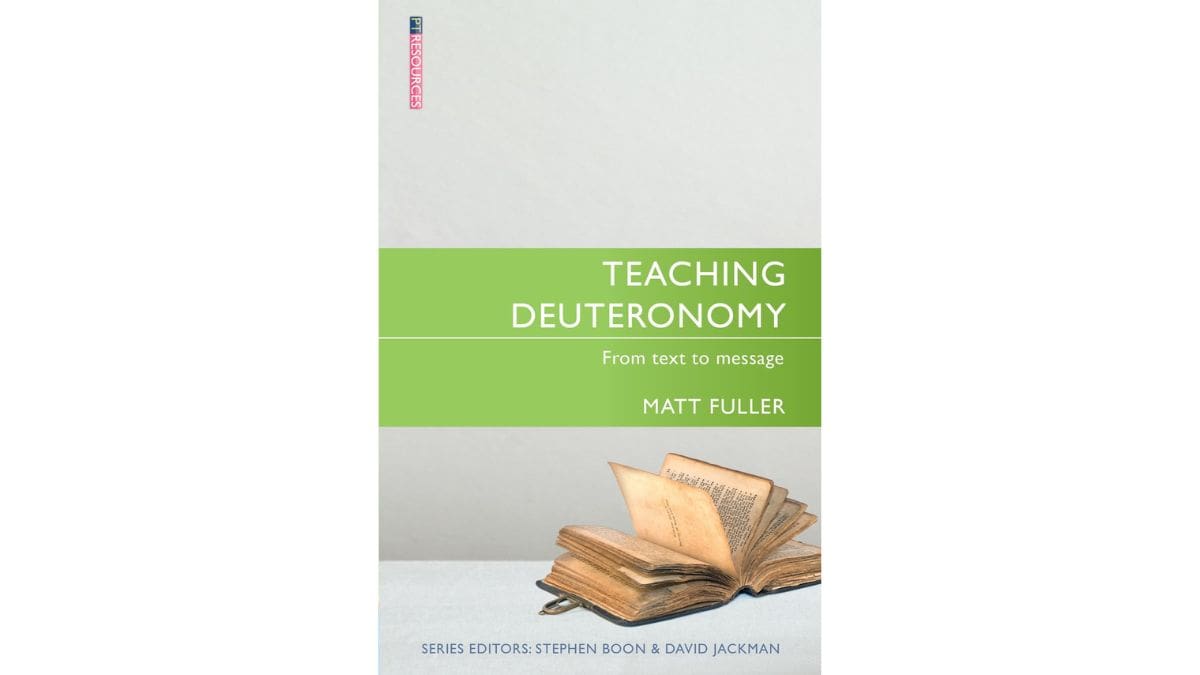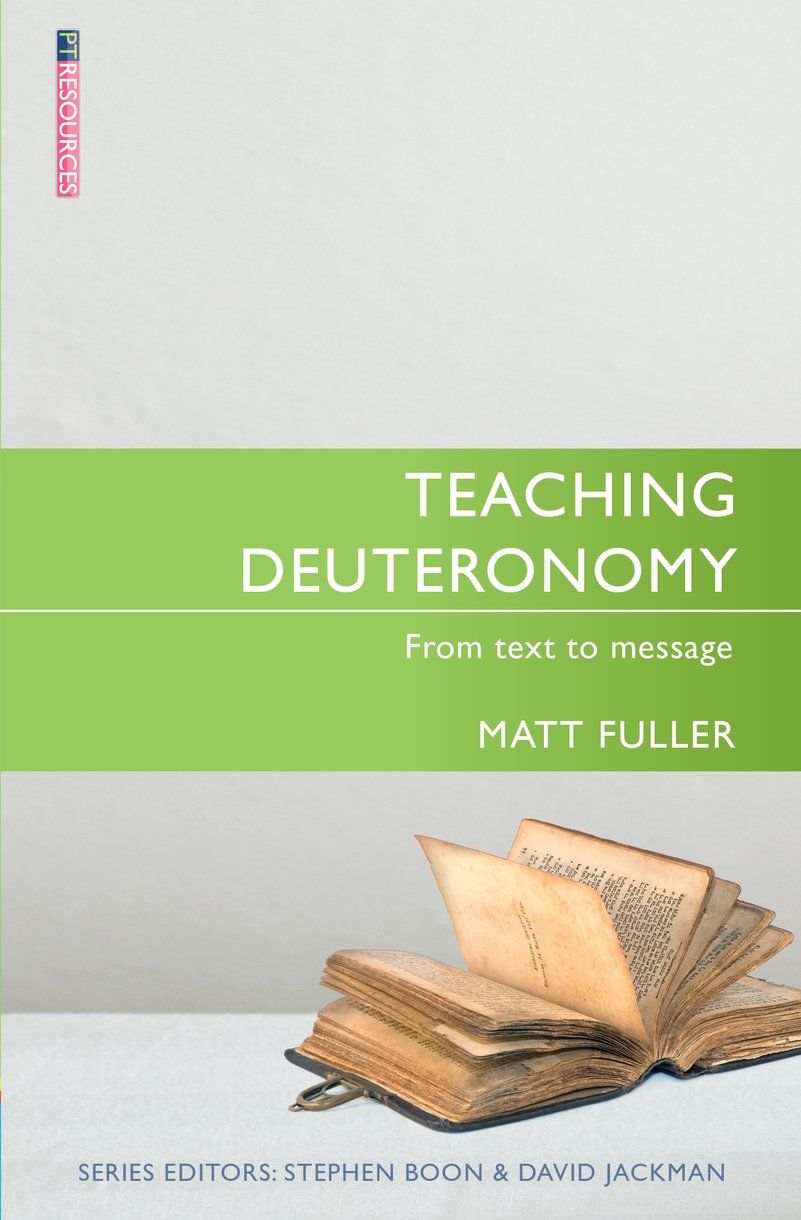Teaching Deuteronomy: From Text to Message
Teaching Deuteronomy is a book written to help pastors and teachers understand its big picture so they can preach and teach it to others.

Teaching Deuteronomy is a 357 page book written by Matt Fuller and published in 2022 by Christian Focus. Matt Fuller is the senior minister at Christ Church Mayfair in London, England and has served in this church for over 20 years.
1. Purpose of Teaching Deuteronomy
The purpose of Teaching Deuteronomy is "to help the preacher or teacher understand the central aim and purpose of [Deuteronomy] in order to preach or teach it to others." (11) This is not a commentary to provide detailed Bible exegesis. Rather Fuller reviews the important purposes and themes of the book "to keep the big picture in mind" (11) to help prepare us to preach and teach Deuteronomy to our hearers.
2. Content of Teaching Deuteronomy
In his 40 page introduction, the author reviews the purpose, tone, themes, and structure of Deuteronomy which he describes as "one of the least preached books in our churches." (12) Deuteronomy was written as Moses' final urgent call to Israel to choose to love Yahweh and obey him in response to his grace. The tone is both optimistic and pessimistic. Deuteronomy is not primarily concerned with external obedience, but rather, Moses is calling the people of Israel "to love the Lord your God from the heart." (19)
The readers of Deuteronomy are presented with two choices to make. They can love God and obey him which leads to blessing. They can follow other gods and disobey God which leads them to suffering God's curse. Moses describes the anticipated promised land of Canaan for Israel as both a gift of God and a reward for obedience.
Regarding its structure, Deuteronomy contains Moses's three speeches with a song and a few editorial comments in between. It has a chiastic structure with its center being chapters 12–26. Fuller suggests teachers teach through the entire book (7 to 20 lessons) or teach a three to five part series through a smaller portion (i.e. Deut 4, Deut 6–11, or Deut 29–30).
Five Reason for Teaching Deuteronomy
- It deepens our understanding of the work of Christ.
- It deepens our understanding of the New Testament.
- It explains the urgent need to choose 'today' between two paths.
- It preaches very practically to the idols of our hearts.
- It delivers us from a nebulous self-defined love of God and reminds us that obedience to God's law matters.
Structure of the Book's Twenty Chapters
The subsequent 300 pages are divided into 20 chapters which cover the individual sections of Deuteronomy in greater detail. Each chapter is organized using the following subheadings:
- Introduction: a concise summary of the portion of text.
- Listening to the text: a concise discourse analysis and review of the immediate structure of the text.
- Working through the text: a concise commentary and discussion of the text.
- From text to message: a central theme and purpose is given, and some suggested applications are provided.
- Suggestions for preaching: options on how to divide the passage for preaching, and questions to ask to help with the passage interpretation and application.
Twenty Chapter Headings of Teaching Deuteronomy
- Learning from Past Mistakes (Deut 1–3)
- A Voice from the Fire (Deut 4)
- Walk in All of God's Ways (Deut 5)
- Love the Lord with All You've God (Deut 6)
- Chosen for Holiness (Deut 7)
- Don't Take Pride in Your Success (Deut 8)
- How Will You Enter the Promised Land? (Deut 9:1–10:11)
- What Does the Lord Require of You? (Deut 10:12–11:32)
- Don't Worship like That (Deut 12)
- The Truth Matters (Deut 13:1–14:21)
- Have an Open Hand, Not a Begrudging Heart (Deut 14:22–16:17)
- What Do We Do Without Moses? (Deut 16:18–18:22)
- Matters of Life and Death (Deut 19:1–22:8)
- Protecting the Boundaries of Relationship (Deut 22:9–23:18)
- Be Open Handed, Not Tight Fisted (Deut 23:19–25:16)
- A People of Curse and a God of Blessing (Deut 26–28)
- Beward a Poisonous Root and a Bitter Fruit (Deut 29)
- Choose Life (Deut 30)
- A Faithful God and a Faithless People (Deut 31:1–32:47)
- Happy Are You...a People Secure in the Everlasting Arms (Deut 33–34)
3. Commentary of Teaching Deuteronomy
The most valuable portion of the book is its first 50 pages. I appreciate Fuller's discussion found on pages 30–35 on the continuity and discontinuity of Deuteronomy and how it applies to today's Christian. We are "not Israelites on the plains of Moab," but we must be careful not to suggest "that God offered salvation by works in the Old Testament." To harmonize how Deuteronomy and the gospel of Moses relate to Acts and the gospel of the New Testament is an essential task to properly understand and teach Deuteronomy.
There is continuity in that both Israel and Christians indicate their genuine faith by living lives of obedience to God's word. But do not flatten biblical revelation! There is a discontinuity in assurance. Deuteronomy predicts that although individuals may be faithful, the nation overall will eventually fail. There is a mood of pessimism that hangs over Deuteronomy because of the hard hearts of the Israelites. (34)
The author's proposed structure of Deuteronomy provides a backbone for Bible teachers to use as they plan to teach through the book, whether one drafts a concise 7 lesson series or a fuller 16–20 lesson series. I found Fuller's structure and lists of reasons why it is important to preach Deuteronomy both compelling and reasoned. His suggestions to teach through the "frame" of Deuteronomy (chapters 1–11 and chapters 27–34) as practical since the meat of Moses' sermons are found in these outer chapters.
4. Comparison Analysis
I have not read through another book that guides Bible teachers through Deuteronomy quite like Teaching Deuteronomy. The Teach the Text Bible Commentaries by Baker Books serves a similar purpose, but it only covers Exodus, Leviticus, and Numbers and bypasses Deuteronomy.
5. Final Thoughts on Teaching Deuteronomy
Teaching Deuteronomy is a terrific, unique resource for Bible teachers and pastors who desire to teach through the book of Deuteronomy. It is not a replacement for an exegetical commentary, but it is a helpful guide that assists pastors as they consider and plan a new teaching series on the book. Highly recommended to anyone planning to teach through Deuteronomy.

Teaching Deuteronomy: From Text to Message
by Matt Fuller | Christian Focus (2022)




